
If you’ve just recently started learning the language, you might have wondered at some point: “What are all these animals called in Greek?” If this question has crossed your mind, then you’re in the right place!
Animals are all around us, and the ecosystem of Greece includes many different animal species (including some unique ones).
We’ve created for you an extensive list of the most well-known animals in Greek, along with their pronunciation and translation.
Feel free to browse through them by category below.
 Table of Contents
Table of Contents
- At Home (Pets)
- On the Farm (Farm Animals)
- In the Wild / Forest / Safari (Mammals)
- In the Ocean
- Bugs & Insects
- Birds
- Reptiles & Amphibians
- Animal Body Parts
- Animal-Related Idioms & Slang Phrases
- Conclusion
1. At Home (Pets)
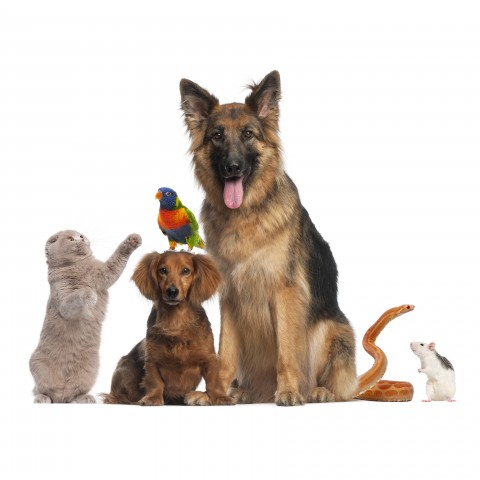
Many people have pets, and even more people love them. What better way to start a conversation than to ask someone about their furry (or feathery or scaly) friend?
To get you started, here are the names of popular pets in Greece:
- Greek: κατοικίδιο
- Romanization: katikídio
- Translation: “pet”
- Greek: γάτα
- Romanization: gáta
- Translation: “cat”
- Greek: σκύλος
- Romanization: skílos
- Translation: “dog”
- Greek: χάμστερ
- Romanization: hámster
- Translation: “hamster”
- Greek: καναρίνι
- Romanization: kanaríni
- Translation: “canary”
- Greek: κουνέλι
- Romanization: kunéli
- Translation: “rabbit”
- Greek: ιγκουάνα
- Romanization: igkuána
- Translation: “iguana”
- Greek: παπαγάλος
- Romanization: papagálos
- Translation: “parrot”
- Greek: χρυσόψαρο
- Romanization: hrisópsaro
- Translation: “goldfish”
➜ Don’t forget to check out our lesson on pets, where you can also find recordings of their pronunciation.
2. On the Farm (Farm Animals)
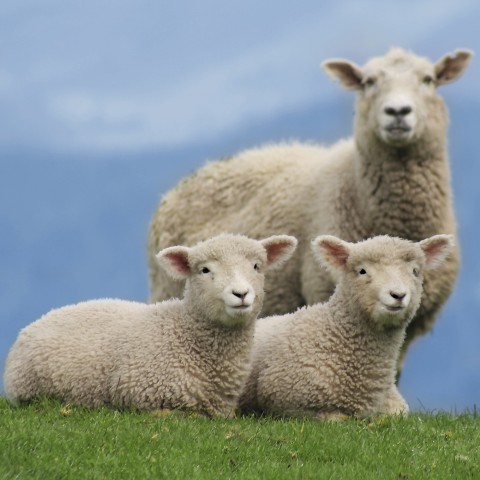
Have you ever visited a farm?
Well, in Greece you may find lots of farms where you can see various animals and taste local dairy products. During your visit to Greece, make sure to keep an eye out for any local farms!
Below, you’ll find a list of common farm animals in Greek:
- Greek: αγελάδα
- Romanization: ayeláda
- Translation: “cow”
- Greek: ταύρος
- Romanization: távros
- Translation: “bull”
- Greek: γουρούνι
- Romanization: gurúni
- Translation: “pig”
- Greek: γάιδαρος
- Romanization: gáidaros
- Translation: “donkey”
- Greek: άλογο
- Romanization: álogo
- Translation: “horse”
- Greek: πάπια
- Romanization: pápia
- Translation: “duck”
- Greek: κότα
- Romanization: kóta
- Translation: “hen”
- Greek: κόκορας
- Romanization: kókoras
- Translation: “rooster”
- Greek: κοτόπουλο
- Romanization: kotópulo
- Translation: “chicken”
- Greek: χήνα
- Romanization: hína
- Translation: “goose”
- Greek: μουλάρι
- Romanization: mulári
- Translation: “mule”
- Greek: κατσίκα
- Romanization: katsíka
- Translation: “goat”
- Greek: κατσίκι
- Romanization: katsíki
- Translation: “kid” / “young goat”
- Greek: πρόβατο
- Romanization: próvato
- Translation: “sheep”
3. In the Wild / Forest / Safari (Mammals)
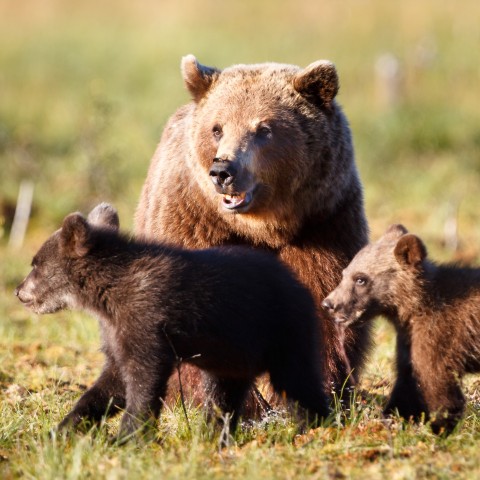
Okay, we might not have safari tours in Greece, but our land is blessed with many forests. Greek wildlife includes bears, foxes, and deer.
Which of the following animals are native to your country?
- Greek: τίγρης
- Romanization: tígris
- Translation: “tiger”
- Greek: ελέφαντας
- Romanization: eléfandas
- Translation: “elephant”
- Greek: αλεπού
- Romanization: alepú
- Translation: “fox”
- Greek: αρκούδα
- Romanization: arkúda
- Translation: “bear”
- Greek: μαϊμού
- Romanization: maimú
- Translation: “monkey”
- Greek: γορίλας
- Romanization: gorílas
- Translation: “gorilla”
- Greek: ιπποπόταμος
- Romanization: ipopótamos
- Translation: “hippopotamus”
- Greek: καμήλα
- Romanization: kamíla
- Translation: “camel”
- Greek: καμηλοπάρδαλη
- Romanization: kamilopárdali
- Translation: “giraffe”
- Greek: ζέβρα
- Romanization: zévra
- Translation: “zebra”
- Greek: τσιτάχ
- Romanization: tsitáh
- Translation: “cheetah”
- Greek: λεοπάρδαλη
- Romanization: leopárdali
- Translation: “leopard”
- Greek: ρινόκερος
- Romanization: rinókeros
- Translation: “rhino”
- Greek: λιοντάρι
- Romanization: liondári
- Translation: “lion”
- Greek: ελάφι
- Romanization: eláfi
- Translation: “deer”
4. In the Ocean

Oh, the ocean! Sea, sun, sand…and Greece!
The marine world of Greece is rich and typical of the Mediterranean Sea. With so many islands and a vast coastline, Greece is the ideal place to taste some fresh fish and seafood in so many different recipes.
In this section, you can find some of the most prominent marine species:
- Greek: καρχαρίας
- Romanization: karharías
- Translation: “shark”
- Greek: φάλαινα
- Romanization: fálena
- Translation: “whale”
- Greek: δελφίνι
- Romanization: delfíni
- Translation: “dolphin”
- Greek: χταπόδι
- Romanization: htapódi
- Translation: “octopus”
- Greek: γαρίδα
- Romanization: garída
- Translation: “shrimp”
- Greek: καλαμάρι
- Romanization: kalamári
- Translation: “squid”
- Greek: ψάρι
- Romanization: psári
- Translation: “fish”
- Greek: ιππόκαμπος
- Romanization: ipókambos
- Translation: “seahorse”
- Greek: αχινός
- Romanization: ahinós
- Translation: “sea urchin”
- Greek: μύδι
- Romanization: mídi
- Translation: “mussel”
- Greek: στρείδι
- Romanization: strídi
- Translation: “oyster”
- Greek: τόνος
- Romanization: tónos
- Translation: “tuna”
➜ Take a look at our lesson about the ocean and get a taste of authentic Greek pronunciation.
5. Bugs & Insects
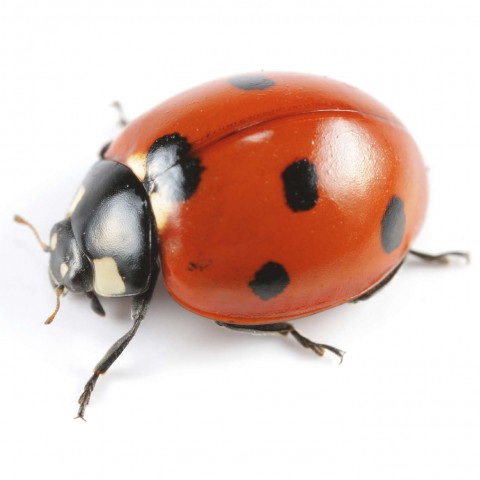
Some people love them. Some people hate them.
But whatever camp you’re in, you have to learn what to call them:
- Greek: ζουζούνι
- Romanization: zuzúni
- Translation: “bug”
- Greek: έντομο
- Romanization: éndomo
- Translation: “insect”
- Greek: μυρμήγκι
- Romanization: mirmígi
- Translation: “ant”
- Greek: μύγα
- Romanization: míga
- Translation: “fly”
- Greek: μέλισσα
- Romanization: mélisa
- Translation: “bee”
- Greek: κουνούπι
- Romanization: kunúpi
- Translation: “mosquito”
- Greek: πασχαλίτσα
- Romanization: pashalítsa
- Translation: “ladybug”
- Greek: αράχνη
- Romanization: aráhni
- Translation: “spider”
- Greek: κατσαρίδα
- Romanization: katsarída
- Translation: “cockroach”
- Greek: σκαθάρι
- Romanization: skathári
- Translation: “beetle”
- Greek: σκώρος
- Romanization: skóros
- Translation: “moth”
- Greek: σφήκα
- Romanization: sfíka
- Translation: “wasp”
6. Birds
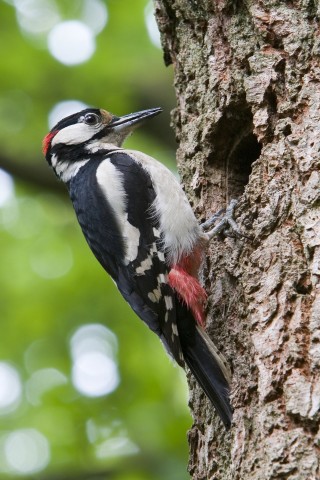
Our next set of animal names in Greek are…birds! They’re incredible creatures, for sure, and you’ll find these words handy if you plan to do any birdwatching during your visit!
- Greek: πουλί
- Romanization: pulí
- Translation: “bird”
- Greek: γλάρος
- Romanization: gláros
- Translation: “seagull”
- Greek: περιστέρι
- Romanization: peristéri
- Translation: “pigeon”
- Greek: χελιδόνι
- Romanization: helidóni
- Translation: “swallow”
- Greek: αετός
- Romanization: aetós
- Translation: “eagle”
- Greek: γεράκι
- Romanization: yeráki
- Translation: “hawk”
- Greek: κοράκι
- Romanization: koráki
- Translation: “crow”
- Greek: κουκουβάγια
- Romanization: kukuváya
- Translation: “owl”
- Greek: τρυποκάρυδος
- Romanization: tripokáridos
- Translation: “woodpecker”
- Greek: παγώνι
- Romanization: pagóni
- Translation: “peacock”
- Greek: στρουθοκάμηλος
- Romanization: struthokámilos
- Translation: “ostrich”
- Greek: κύκνος
- Romanization: kíknos
- Translation: “swan”
7. Reptiles & Amphibians
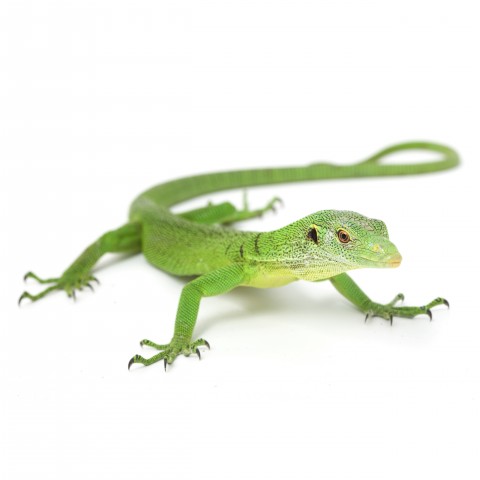
Some people keep reptiles as pets, whereas others are just fascinated by amphibians’ ability to live both in and out of the water. In any case, here are some of the most important reptiles and amphibians in Greek:
- Greek: ερπετό
- Romanization: erpetó
- Translation: “reptile”
- Greek: αμφίβιο
- Romanization: amfívio
- Translation: “amphibian”
- Greek: βάτραχος
- Romanization: vátrahos
- Translation: “frog”
- Greek: κροκόδειλος
- Romanization: krokódilos
- Translation: “crocodile”
- Greek: αλιγάτορας
- Romanization: aligátoras
- Translation: “alligator”
- Greek: φίδι
- Romanization: fídi
- Translation: “snake”
- Greek: σαύρα
- Romanization: sávra
- Translation: “lizard”
- Greek: σκουλήκι
- Romanization: skulíki
- Translation: “worm”
- Greek: χελώνα
- Romanization: helóna
- Translation: “turtle”
8. Animal Body Parts
Now that you’ve learned what to call the most common animals in the Greek language, let’s go over the different animal body parts. Learning these words will help you better describe any animals you encounter!
- Greek: ουρά
- Romanization: urá
- Translation: “tail”
- Greek: φτερoύγα
- Romanization: fterúga
- Translation: “wing”
- Greek: φτερό
- Romanization: fteró
- Translation: “wing” / “feather”
- Greek: δαγκάνα
- Romanization: dagkána
- Translation: “claw”
- Greek: κέρατο
- Romanization: kérato
- Translation: “horn”
- Greek: ράμφος
- Romanization: rámfos
- Translation: “beak”
- Greek: πόδι
- Romanization: pódi
- Translation: “leg”
- Greek: οπλή
- Romanization: oplí
- Translation: “hoof”
- Greek: λαιμός
- Romanization: lemós
- Translation: “neck”
Want more? See our vocabulary list Sounds That Animals Make!
9. Animal-Related Idioms & Slang Phrases
Since animals are all around us, it’s sensible that they have influenced our everyday conversations. While in Greece, you may encounter many different idioms, slang phrases, and even metaphors that refer to different animals.
- Greek: Νιώθω πεταλούδες στο στομάχι.
- Romanization: Niótho petalúdes sto stomáhi.
- Translation: “I feel butterflies in my stomach.”
- Greek: Αυτός είναι το μαύρο πρόβατο της οικογένειας.
- Romanization: Aftós íne to mávro próvato tis ikoyénias.
- Translation: “He’s the black sheep of the family.”
- Greek: Αυτός τρέμει σαν το ψάρι από τον φόβο του.
- Romanization: Aftós trémi san to psári apó ton fóvo tu.
- Translation: “He’s shaking like a fish from (his) fear.”
- Greek: Το παιδί έριξε το βάζο και τώρα κάνει την πάπια.
- Romanization: To pedí érixe to vázo ke tóra káni tin pápia.
- Translation: “The child dropped the vase and now acts like a duck.”
- Meaning: The child is acting as if they don’t know anything.
- Greek: Είμαι κότα. Φοβάμαι να κάνω ελεύθερη πτώση.
- Romanization: Íme kóta. Fováme na káno eléftheri ptósi.
- Translation: “I am a hen. I am afraid to do a freefall.”
- Meaning: I am too chicken to do a freefall.
10. Conclusion
In this article, we tried to cover as many animals as possible. However, if you need to know the Greek word for another animal, feel free to leave a comment below.
GreekPod101.com offers you high-quality, practical knowledge about the Greek language.
At GreekPod101.com, we aim to provide you with everything you need to know about the Greek language in a fun and interesting way. Stay tuned for more articles like this one, word lists, grammar tips, and even YouTube videos, which are waiting for you to discover!
You can also upgrade to Premium PLUS and take advantage of our MyTeacher program to learn Greek with your own personal teacher, who will answer any questions you might have!
We’d love to hear what your favorite animal is, as well. If you’re confident enough, try creating some sentences about your favorite animal and write them in the comments below to practice.










